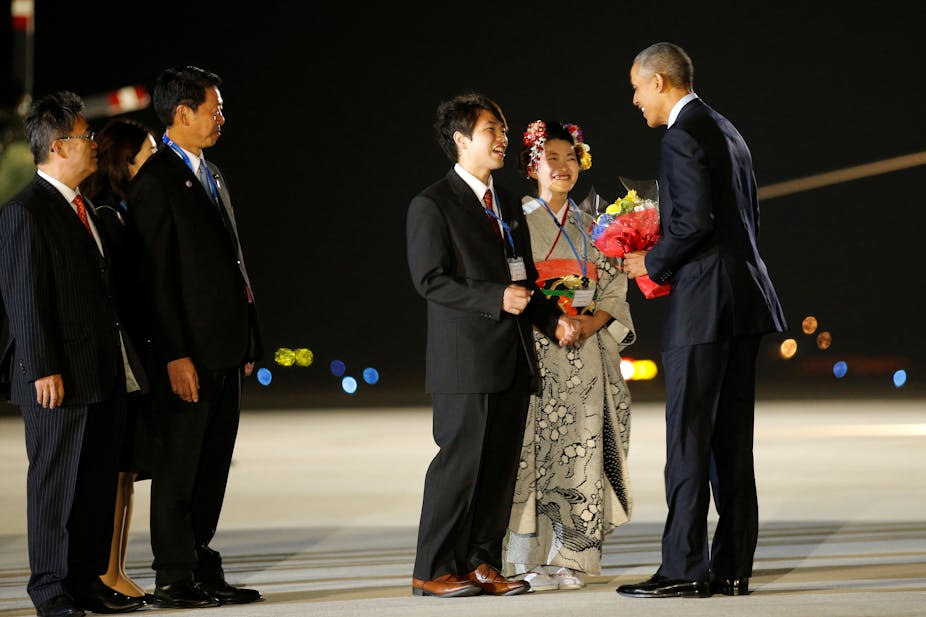President Barack Obama’s visit to Japan and Vietnam this week will be historic.
It provides him the occasion to resolve some lingering issues from two past American conflicts in Asia. The visit will also reassure America’s allies and strategic partners in the area about the country’s commitment to Asia, particularly in light of China’s militarization of the South China Sea. Above all, though, this is a key opportunity to showcase the power of remembrance and reconciliation.
From my perspective as a historian of Japan and East Asia for over 25 years, and as a teacher of university courses on historical memory, it strikes me that Obama’s presence in Hiroshima – the first by a sitting president – may be one of the actions for which he will be most remembered on both sides of the Pacific.
Remembrance, not apology
According to Deputy National Security Advisor Ben Rhodes, Obama will not revisit the decision to use the atomic bomb when he travels to Hiroshima later this week. There will be no apology, although some veterans’ groups in Japan have called for one.
Some conservative forces in the U.S., however, see the mere presence of the president in Hiroshima as an apology. But this is to miss Obama’s intent. Given his history as Nobel Peace Prize winner and as a major advocate for nuclear nonproliferation, the president’s trip should be seen as an act of commemoration for all who died in the Pacific War. As the leader of the only country in the world to use nuclear weapons, Obama’s presence and any remarks of remembrance and acknowledgment of the terrible human toll of war will be powerful acts of reconciliation.
Obama’s trip recalls President Reagan’s visit to German graves at Bitburg in 1985, minus the complicating issue of the SS troops who were buried there. Some 70,000-80,000 Japanese died in the atomic bombing of Hiroshima on August 6, 1945. Moreover, while not widely known, at least a dozen American prisoners of war were incinerated in the same blast. I believe all of these victims of war, Japanese and American, should be publicly commemorated.

Overcoming differences
These acts are particularly important because the U.S. and Japan have not seen eye to eye on many aspects of the Pacific War, including the atomic bomb. This was evident in 1995, when planning for a joint commemoration of the 50th anniversary of the war’s end fell apart.
That same year, the Smithsonian exhibit “The Crossroads: The End of WWII, the Atomic Bomb, and the Cold War” failed to launch. It was scrapped under pressure from veterans groups and lawmakers, who argued that it did not provide adequate justification for the bombing. They also asserted that the planned exhibit depicted America as aggressor and the Japanese as victims.
Japan, too, has had its own “history wars” over how to commemorate the Pacific War and those who fought and died in it. Controversies emerged over official visits to Yasukuni Shrine. Plans for a museum to be called the “War Victims Peace Commemoration Prayer Hall” met with opposition from the political left in Japan and abroad. They protested against the idea of a museum as war memorial. In the end, a reconceived Showa Hall was built. It is a bland exhibition of wartime life in Japan, one that avoids direct reference to Pearl Harbor, Hiroshima and even the front lines of battle.

Japan during the Pacific War was perhaps America’s most hated enemy. Yet the two countries later restored the amicable relations that predated the conflict. After a period of U.S. occupation (1945-52), Japan has remained America’s closest strategic ally in Asia. In fact, just last year the countries agreed to new Joint Defense Guidelines, which takes the bilateral military relationship to a new level by now allowing Japan to defend the U.S. and its partners in Asia.
Differing national perspectives on the Pacific War will likely persist. Yet, by expressing his remorse at the great loss of life on both sides in the Pacific War and advocating again for the end of nuclear proliferation, President Obama will demonstrate to Japan and our other allies that we too can confront history. The trip is bound to strengthen the bonds between the two nations and signal to the Japanese that they are valued as partners in American strategic thinking.
Vietnam redux
While Obama will be the third American president to travel to Vietnam since the end of the Vietnam War in 1975, issues still remain from that conflict that the U.S. can help resolve. For example, there are indications that the president may announce additional funding for Agent Orange cleanup to improve the environment there that was, like Hiroshima, scarred by technological warfare waged by the U.S.
The decision announced this week to lift the arms embargo on Vietnam will improve the defense relationship between the two countries. This final step to full normalization of U.S.-Vietnam ties should be seen as part of Obama’s rebalance to Asia. It bolsters Vietnam as a counterweight to China’s efforts to dominate the South China Sea, which is so vital to global trade.
In visiting Japan and Vietnam – two Asian countries with whom America fought deadly wars – President Obama can underscore the power of remembrance and reconciliation. In doing so, he can reconnect with a theme laid out in his speech in Prague in 2009: that the U.S. has a moral responsibility to work toward a peaceful world, one without nuclear weapons. It would be difficult to think of a more fitting legacy for him, especially given all the uncertainties of today’s global political climate.

